70个容易混淆的英语句子汇总
容易让人误解的一些英语口语

容易让人误解的一些英语口语1.Do you have a family?你有孩子吗?2.Its a good father that knows his son。
就算是最好的父亲,也未必了解自己的儿子。
3.I have no opinion of that sort of man。
我对这类人很反感。
4.She put 5 dollars into my hand, "you have been a great man today."她把5美圆塞到我手上说:“你今天表现得很好。
”5.I was the youngest son, and the youngest but two。
我是最小的儿子,但是我还有两个妹妹。
6.The picture flattered her。
她比较上照。
7.The country not agreeing with her, she returned to England。
她在那个国家水土不服,所以回到了英国。
8. He is a walking skeleton。
他很瘦。
9.The machine is in repair。
机器已经修好了。
10.He allowed the father to be overruled by the judge, and declared his own son guilty。
他让法官的职责战胜了父子的亲情,最终宣布儿子有罪。
11.You dont know what you are talking about。
你在胡说八道。
12.You dont begin to understand what they mean。
你根本不知道他们在干嘛。
(dont begin :决不)13.They didnt praise him slightly。
他们大大地表扬了他。
14.Thats all I want to hear。
英语易错谚语
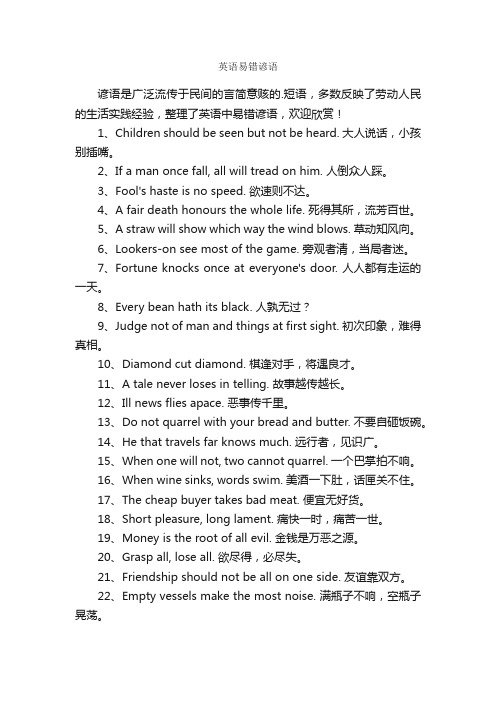
英语易错谚语谚语是广泛流传于民间的言简意赅的.短语,多数反映了劳动人民的生活实践经验,整理了英语中易错谚语,欢迎欣赏!1、Children should be seen but not be heard. 大人说话,小孩别插嘴。
2、If a man once fall, all will tread on him. 人倒众人踩。
3、Fool's haste is no speed. 欲速则不达。
4、A fair death honours the whole life. 死得其所,流芳百世。
5、A straw will show which way the wind blows. 草动知风向。
6、Lookers-on see most of the game. 旁观者清,当局者迷。
7、Fortune knocks once at everyone's door. 人人都有走运的一天。
8、Every bean hath its black. 人孰无过?9、Judge not of man and things at first sight. 初次印象,难得真相。
10、Diamond cut diamond. 棋逢对手,将遇良才。
11、A tale never loses in telling. 故事越传越长。
12、Ill news flies apace. 恶事传千里。
13、Do not quarrel with your bread and butter. 不要自砸饭碗。
14、He that travels far knows much. 远行者,见识广。
15、When one will not, two cannot quarrel. 一个巴掌拍不响。
16、When wine sinks, words swim. 美酒一下肚,话匣关不住。
17、The cheap buyer takes bad meat. 便宜无好货。
英语易混淆句子

1. The man is in the black. The man is in black.2. The woman is in the red. The woman is in red.3. Those students are in the green. Those students are in green.4. The man is yellow. The man is in yellow.5. The worker is in the blue now. The worker is in blue now.6. Tom was given the boot. Tom was given the boots.7. The boss gave her the kick. The boss gave her a kick.8. They were given the push. They were given a push.9. Tom has got some salts. Tom has got some salt.10. She has written a book about her fathers.She has written a book about her father.11. She is sick for her. She is sick of her.12. She is in the dock. She is in dock.13. The old man told the tale. The old man told a tale.14. Who keeps shop? Who keeps a shop?15. The two old men are chewing the fat.The two old men are chewing fat.16. He didn’t say the word. He didn’t say a word.17. Bob went to sea last week. Bob went to the sea last week.18. We are members of the society. We are members of society.19. He went to stool. He went to the/a stool.20. out of question out of the question21. He is in a fog now. He is in fog now.22. It’s a paper. It’s a piece of paper.23. John took breath. John took a breath.24. The man went to jail. The man went to the jail.25. They exchanged words. They exchanged a word.26. She had words with him. She had a word with him.27. He went to drink water. He went to drink the waters.28. He is a man of his word. He is a man of few words.29. Who is the man in the dumps?Who is the man in the dump?30. I like his writings very much.I like his writing very much.31. Please take note of the lecture.Please take notes of the lecture.32. John enjoys travels. John enjoys travel.33. Bob went back on his word.Bob ate his words.34. She laid a hand on the boy. She laid hands on the boy.35. Have you bought any coppers? Have you bought any copper?36. Do you have any irons? Do you have any iron?37. They’re in the rains now. They’re in rain now.38. What is on his mind? What is in his mind?39. He is shouting at them. He is shouting to them.40. Their plan is in the air. Their plan is on the air.41. She is cautious of telling the secret.She is cautious in telling the secret.42. Is he for the football team? Is he on the football team?43. Is his wife in work? Is his wife at work?44. He was the person in question.He was the person under question.45. I stand up to the plan. I stand up for the plan.46. She is engaged with him. She is engaged to him.47. He is the minister/ embassador of China.He is the minister/ embassador to China.48. The women are chatting over the work.The women are chatting about the work.49. Mr Smith is absent from London.Mr Smith is absent in London.50. They are running after him.They are running behind him.51. They came to his help. They came for his help.52. The waitress is waiting on them.The waitress is waiting for them.53. The radio is in (good) repair.The radio is under repair.54. Do you know her? Do you know of her?55. He has gone to his rest. He has gone to rest.56. Who told on you? Who told you?57. Let’s begin with the direction.Let’s begin the direction.58. I don’t believe her. I don’t believe in her.59. I’ll consult him. I’ll consult with him.60. Can you walk him? Can you walk with him?61. Don’t talk rubbish. Don’t talk about rubbish.62. Let’s talk turkey. Let’s talk about the turkey.63. Let’s enlarge on it. Let’s enlarge it.64. It’s wine of a sort/kind. It’s a sort/kind of wine.65. They repaired to the hotel. They repaired the hotel.66. She passed me by. She passed by me.67. She has seen him through.She has seen through him.68. This is a brand new watch. This is a new brand watch.69. They’re good sailors. They’re good sailers.70. The girl has lost her heart. The girl has lost heart.71. The fellow is serving his time. The fellow is serving time.72. The girl has given her hand to him.The girl has given him a hand.73. He is a confidence man. He is a confident man.74. Watch your time. =Bide one’s time. Watch time.75. Where’s the Book? Where’s the book?76. Me has entered the House. Me has entered the house.77. The old man has met the Maker.The old man has met the maker.78. You should thank the Creator.You should thank the creator.79. I’m going to see the Rockets (the Lakers/the Suns).I’m going to see the rockets (the lakers/the suns).80. He buried himself in the countryside.He was buried in the countryside.81. He is an ill man. He is a sick man.82. The painting is invaluable=priceless.The painting is valueless.83. The old man is very poorly=sick.The old man is very poor.84. Her husband is talkative. Her husband is eloquent.85. The Cate President was greatly respected by the people.The former President was greatly respected by the people.86. Their English is all but correct.Their English is anything but correct.87. I showed them the door. I showed them to the door.88. Mrs Green often keeps open house.Mrs Green often keeps the house open.89. It’s a fortune! It’s a piece of fortune!90. The boy is no fool. The boy is not a fool.91. That’s a tallboy. That’s a tall boy.92. Don’t pay your attentions to her.Don’t pay attention to her.93. It’s a property. It’s a piece of property.94. She was afraid of waking her husband.She was afraid to wake her husband.95. There is a stony road. There is a stone road.96. The Speaker has come. The speaker has come.97. He knows nothing about the Heavens.He knows nothing about the heavens.98. The veteran has retired. The old soldier has retired.99. It’s hot, not to speak of being warm.It’s warm, not to say hot.100. Her watch is losing. Her watch is lost.。
容易产生歧义的英语句子

容易产生歧义的英语句子英语是一门非常灵活且多义的语言,有时候即使是一句简单的句子也会因为词语的多义性或者语法结构的模糊性而产生歧义。
特别是对于非英语母语者来说,理解这些歧义可能会更加困难。
本文将讨论一些在英语中容易产生歧义的句子,并对它们进行分析和解释。
首先,一些词语的多义性经常会导致句子产生歧义。
比如,“I saw her duck”这句话就有两种解释。
一种是“我看到她躲闪”,另一种是“我看到她的鸭子”。
这里的“duck”既可以指动词“躲闪”,也可以指名词“鸭子”,所以句子的真正含义依赖于上下文。
如果没有上下文的支持,那么读者很难确定句子的确切含义。
另一个常见的例子是“Time flies like an arrow.”这句话听起来似乎很简单,但它的意思可以有多种解释。
一种是“时间像箭一样飞逝”,另一种是“时间飞翔喜欢一个箭”,还有可能是“时间像箭一样喜欢飞逝”。
这一句话之所以产生歧义,主要是因为“like”和“an arrow”可以有不同的修饰对象。
所以,要想完全理解这句话的含义,读者需要依赖于上下文或者其他线索。
不仅是词语的多义性,有时候句子的语法结构也会让人产生误解。
比如,“The old man the boats.”这句话看上去是一个简单的陈述句,但它实际含义可能会有不同的解释。
一种可能的解释是“老人管理这些船”,另一种是“这些船老化了”。
这里的歧义主要来自动词“man”的不同解释。
如果“man”被理解为及物动词,那么这句话的意思是“老人管理船只”,如果“man”被理解为名词,那么这句话的意思是“船只老化了”。
对于非英语母语者来说,这种歧义可能会让他们感到困惑。
此外,有时候句子的语态也会让人产生误解。
比如,“The chicken is ready to eat.”这句话看上去似乎没有什么问题,但它的含义可能会有不同的解释。
一种可能是“鸡准备好了,可以吃了”,另一种是“鸡已经准备好了,可以吃了”。
70个容易混淆的英语句子汇总

70个容易混淆的英语句子汇总1. A lawyer would make a better statesman than a soldier。
(律师比军人更易成为政治家)A lawyer would make a better statesman than soldier。
(律师更易成为政治家而不是战士)2. He is a child of ten。
He is a father of ten。
(十岁孩子的父亲)3. He served me with a kind of coffee。
He served me with coffee of a kind。
(象是咖啡的东西)4. You love me better than he。
(和you平行)You love me better than him。
(和me平行)5. This is a photo of me。
(本人的)This is a photo of mine。
(我所有的)6. They are an industrious people。
(民族)They are industrious people。
(人)7. He is not a fool。
He is no fool。
(很聪明)8. He has no more than ten books。
(只有十本)He has not more than ten books。
(不足十本)9. He is not a little afraid of it。
(很怕)He is not a bit afraid of it。
(一点不怕)10. I ask you nothing。
(没问你什么)I ask you for nothing。
(没求你什么)11. We hadn't anything to eat。
(没吃的东西了)We didn't have anything to eat。
英语口语中容易犯的失误和误解的句子

英语口语中容易犯的失误和误解的句子英语中有些句子,乍看起来很简单,但是其中的某些词汇和搭配的可能跟常见的意义相去甚远,这时可千万不能望文生义哦!本文为大家总结了英语口语中容易犯的失误和误解的句子,赶快记下来吧!英语口语中容易犯的失误:1. I very like itI like it very much.2. 这个价格对我挺合适的。
The price is very suitable for me.The price is right.Note:suitable(合适的、相配的)最常见的用法是以否定的形式出现在告示或通知上,如:下列节目儿童不宜。
The following programme is not suitable for children在这组句子中用后面的说法会更合适。
3. 你是做什么工作的呢?What's your job?Are you working at the moment?Note:what's your job这种说法难道也有毛病吗?是的。
因为如果您的谈话对象刚刚失业,如此直接的问法会让对方有失面子,所以您要问:目前您是在上班吗?Are you wor king at the moment?接下来您才问:目前您在哪儿工作呢?Where are you working thes e days?或者您从事哪个行业呢?What line of work are you in?顺带说一下,回答这类问题时不妨说得具体一点,不要只是说经理或者秘书。
4. 用英语(论坛)怎么说?How to say?How do you say this in English?Note:How to say是在中国最为泛滥成灾的中国式英语之一,这决不是地道的英语说法。
同样的句子有:请问这个词如何拼写?How do you spell that please?请问这个单词怎么读?How do you pronounce this word?5. 明天我有事情要做。
英语短语容易误解的10个句子

英语短语容易误解的10个句子英语短语容易误解的10个句子1. Do you have matches?最近我有一次机会登上一艘豪华游轮观光。
我在酒吧台拿了两杯鸡尾酒回房间享受,途中遇到一位女士,她看看我后笑着说:"You have matches?"我一愣,回答说:“很抱歉,我十五年前就戒烟了,所以没有火柴。
”她立刻会意到我误解了她的意思,好像是有点抱歉地说:"It's a joke."然后,除了尴尬就没有然后了。
事后和朋友在吃晚饭的时候聊天,我趁机向一个美国朋友请教白天的那句话,他解释说:“因为她看你两手都占着,就故意开玩笑跟你要火柴,这是个非常普通的笑话,其实是想问你需不需要帮忙。
”2. Turn the table一位亲戚和妻子失和到了要离婚的地步。
几天前接到亲戚电话,说他们在走进律师楼之前,先去求助于心理和婚姻问题专家。
夫妇俩心平气和地坐下来谈了好多次,互相之间多了份理解,少了一份猜疑、埋怨,结果化干戈为玉帛。
说简单也简单,就这么拯救了这场婚姻。
我打心眼里为他们高兴,把这一消息告诉了同样也认识他们的一位美国朋友。
这位朋友很激动,还补了一句:"He turned the table"。
这话让我心里很不舒服,她是指我亲戚动粗吗?直到朋友以另一种方法向我解释,她是说我亲戚“扭转了局面”,那table和我想到的“桌子”根本无关。
turn the tables (on someone) = to suddenly take a positionof strength or advantage that was formerly held by someone else(反败为胜,转弱为强)例句:She played badly in the first set, but then she turned thetables on her opponent and won the match。
容易误解的英语习语
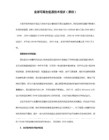
2.be not fit to hold a candle 远远比不上
be not fit to hold a candle的意思可以追溯到电器发明之前,英国人和中国人一样靠蜡烛照明。工匠晚上做工,会叫学徒给他掌烛;有钱人晚上从酒馆、戏院等回家,也有仆从拿着火把引路。仆从跟主人的身分本来就很悬殊;假如连做仆从给人家掌烛都不配,那么,双方的地位、能耐等一定是相差很远的了。所以现在一般用这个词表示远远比不上。
很容易被翻译成瞎约会或者盲目的约会, blind date其实指的是由第三方安排的男女初次见面,也就是现如今非常流行的相亲。
9.go to bed with the chickens晚上早睡觉
字面意思很搞笑:和小鸡一起上床睡觉~~其实是指晚上早睡觉。因为小鸡总是很早就回窝睡觉啦。
10.confidence man 骗子
13.bank holiday 公共假期
对于英国这样的老牌资本主义国家来说,如果银行停业,当然就意味着所有商业活动也都会停止,人们也就可以不用上班工作。所以国定假日叫bank holiday。 如果遇到某个Bank Holiday正好是周末的时候, 那就在另外一周 (一般是接下来的一周) 里选一天补成Bank Holiday。
12.fourth estate 记者或新闻界
estate 有地产、遗产、地位的意思。不过这里的fourth estate可不是第四笔地产。欧洲传统上认为社会由贵族、教会、平民三大基层构成。近代新闻记者自成一个势力,则是传统三大阶层以外的第四阶层,称为fourth estate,有人把它译为第四权。
3.eleventh hour 最后时刻
eleventh hour并不是表示十一点,而是表示“最后时刻”的意思。这句成语出自圣经的《马太福音》,有个阔人想雇几个人到他的园子里去干活,他从早上五点就开始雇人,雇到最后一个人时已经是夜里很晚了。干完活后付工钱,结果大早上来的和夜里来的都一视同仁地得到了一枚银币,弄的一大早就开始干活的人极为不满,早知如此,还不如夜里十一点钟来呢,因为只要不超过十二点,都能得到同样的报酬,很像中国的“来的早不如来的巧”,从此eleventh hour 就有了挽回局面的关键时刻的含义。如:The war, which seemed certain, was prevented at the eleventh hour. 人们在最后时刻阻止了这场战争。
容易混淆的英语短句
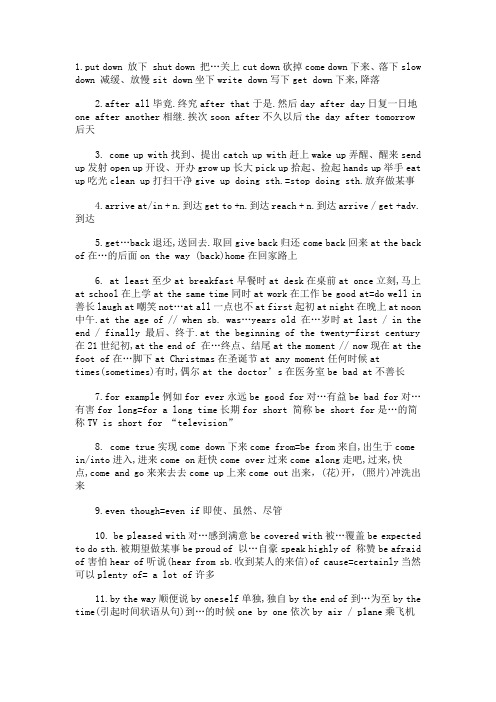
1.put down 放下 shut down 把…关上cut down砍掉come down下来、落下slow down 减缓、放慢sit down坐下write down写下get down下来,降落2.after all毕竟.终究after that于是.然后day after day日复一日地one after another相继.挨次soon after不久以后the day after tomorrow 后天3. come up with找到、提出catch up with赶上wake up弄醒、醒来send up发射open up开设、开办grow up长大pick up拾起、捡起hands up举手eat up吃光clean up打扫干净give up doing sth.=stop doing sth.放弃做某事4.arrive at/in + n.到达get to +n.到达reach + n.到达arrive / get +adv.到达5.get…back退还,送回去.取回give back归还come back回来at the back of在…的后面on the way (back)home在回家路上6. at least至少at breakfast早餐时at desk在桌前at once立刻,马上at school在上学at the same time同时at work在工作be good at=do well in 善长laugh at嘲笑not…at all一点也不at first起初at night在晚上at noon 中午.at the age of // when sb. was…years old 在…岁时at last / in the end / finally 最后、终于.at the beginning of the twenty-first century 在21世纪初,at the end of 在…终点、结尾at the moment // now现在at the foot of在…脚下at Christmas在圣诞节at any moment任何时候attimes(sometimes)有时,偶尔at the doctor’s在医务室be bad at不善长7.for example例如for ever永远be good for对…有益be bad for对…有害for long=for a long time长期for short 简称be short for是…的简称TV is short for “television”8. come true实现come down下来come from=be from来自,出生于come in/into进入,进来come on赶快come over过来come along走吧,过来,快点,come and go来来去去come up上来come out出来,(花)开,(照片)冲洗出来9.even though=even if即使、虽然、尽管10. be pleased with对…感到满意be covered with被…覆盖be expected to do sth.被期望做某事be proud of 以…自豪speak highly of 称赞be afraid of害怕hear of听说(hear from sb.收到某人的来信)of cause=certainly当然可以plenty of= a lot of许多11.by the way顺便说by oneself单独,独自by the end of到…为至by the time(引起时间状语从句)到…的时候one by one依次by air / plane乘飞机by bus / train / car乘公共汽车/火车/轿车(catch a bus赶公交车get on / off the bus上/下车take a bus to…=go to …by bus乘车去)12.do / try one’s best尽力do one’s homework做家庭作业do (the/some) shopping购物do the cooking烹饪do some cleaning打扫do the / some washing 洗衣服do sport做运动do with sb / sth.处理well done干得好(From:)13.early in the morning一大早in the early spring初春in my early days 我幼年时期early bus早班车14.make a contribution to贡献给、捐献make a telephone call to sb. // ring sb. up // give sb. a call // phone sb.给某人打电话connect…to…把…与…连接起来be close to靠近(某地) give birth to生(孩子) lose to sb 输给sb .15.either…or…或者…或者..on either side of the street街道任何一边(on each side of the street街道每一边on both sides of the street街道两边)16.keep doing sth.不停地做某事(表示状态继续)keep on doing sth. 坚持做某事(表示动作反复进行)practise doing sth.练习做某事enjoy doing sth.喜欢做某事finish doing sth.做完某事go on doing sth.继续做某事(同一件事)17.go on to do sth.接着做某事(另一事) go straight along 沿着…一直往前走, go down下降, go for a walk散步, go over复习, go shopping买东西, go to the cinema去看电影, go well进展顺利, go off to动身前往, go out外出 , go to work去上班, go up上升, want a go 想试一试18. think about考虑 (think of 认为、想起、考虑、想到 think over仔细考虑 think out想出)talk about谈论, worry about担心, How / What about…?…怎么样?19.borrow…from …从…借….(lend…to…把…借给…)from door to door 挨家挨户 , from time to time时时, from now on 从今以后 , from then on 从那以后, be different from与…不同, learn…from…向…学习20.get dressed穿衣 , get into进入, get / be lost丢失, get off / on 下/上车 , get on well with sb.与某人相处得好, get out of从…出来 , get ready for +n.为…做准备, get ready to do sth.准备做某事, get / go to sleep (fall asleep)入睡 , (be asleep睡着) get warm 变暧 , get well康复, get a chance 有机会、得到机会21. look for 寻找 , wait for等候 , look after=take care of照看, look like看起来像 , look over检查,复习 , look out小心,从里向外看 , look the same看起来一样, look up向上看,查单词 , look around环视look forward to 期望 , look through温习,检查22. set off 出发、动身, put off 推迟 , keep off 避开、不靠近… drop off放下(某物),turn off关 , jump off跳离 , take off脱(衣),(飞机)起飞(From:)23. half a kilo半千克 , half an hour半小时 , in half分成两半, half of the day半天24. do eye exercises做眼保健操 , do morning exercises做早操take (more) exercise (多)参加体育锻炼 , an exercise book练习本25. take part in参加 , hand in上交 , in hospital住院 , in surprise 吃惊地 , in the sun在阳光下 , in trouble处于困境, in a minute / moment 马上26. leave for…动身去某地27 feed on 以…为主食 , live on继续活着 , base on以…为根据 , carry on坚持、继续下去 , and so on 等等 , on the other hand另一方面 , on foot 步行 28.be famous for以..著名 , be excited about +n./V-ing对…感到兴奋 , be interested in 对…感兴趣 , be born出生 , be busy with sth.— be busy doing sth.忙于…be amazed at 对..感到惊讶29.move away移开 , move to(搬)移到30.search the Internet上网31.make sure 确信 , make a dialogue编对话 , make a mistake犯错误 (by mistake由于疏忽) make a noise吵闹 , make faces做鬼脸 , make friends (with)和..交朋友 , make room for给..让地方, make tea沏茶, make money 赚钱, make a decision作出决定ed to do sth过去常常做某事, be used to doing sth.习惯于做某事33. leave sth+介词短语“把……忘记在某处”34.forget to do sth.忘记做某事 , encourage sb. to do sth.鼓励某人做某事 , decide to do sth.决定做某事 , allow sb. to do sth.允许某人做某事35.hear sb. to do (doing)sth.听见某人做某事36.help sb. (to) do sth .//help sb. with sth. 帮助某人做某事 , with one’s help在某人的帮助下 , with pleasure乐意37.the summer holiday(s)暑假 the winter holiday(s)寒假38.step into走进 , pour into倒入…39.in the first第一 , for the first time第一次, at first起初 , a firs t language母语 , first of all首先40.leave a message for sb.给某人留条, give / take sb. a message给某人捎口信41. take photos / pictures 照像 , take away拿走 , take out取出 (work out算出) take care当心 , take medicine 服药 take one’s temperature 量体温, take one’s time别着急 , take a walk散步 , take place发生42. learn by oneself / teach oneself自学 , learn by heart背熟43. a year and a half (one and a half years ) 一年半44.have a try尝试,努力 , try out尝试、试验 , find out / about找出,查明, have a good / wonderful / great / time玩得开心, have a (bad) cold(重)感冒 , have a meeting / walk / watch开会/散步/比赛 , have sports 进行体育活动 , have nothing / sth. to do with与..无(有)关 , have no idea 不知道, have (one’s) medicine服药45. offer sb sth.给某人提供某物46.win first prize获一等奖47.all over the world= around the world =throughout the world全世界48. all kinds of 各种各样的49. neither… nor 既不…也不….50. not only … but also …不但…而且, both… and ……和…都51. the more , the better 越多越好52. all one’s life 一生53. as soon as 一…就… as soon as pos sible尽可能早地、尽快as well = too也, as much as至多, as little as至少, regard …as 把…当作… , as if 好像54. no matter 无论…55 ever since 从那以后,此后一直56.so far 到目前为止 , or so大约57. another two hours (=two more hours )又(再) 2个小时58. three times a week一周三次59. the numb er of…的数量 a (large / good) number of / large numbers of / many许多60.less than少于 , less and less 越来越少61.…is another way of saying…什么是..的另一说法 Quick is another way of saying fast. Bike is short for bicycle.62. not…until…直到…才…63.be like像 , feel like +n./V-ing想要 , like best最喜欢 , would like to 想要64.the 24 hour clock 24小时制65.wash away冲走,run away逃跑 , take away带走66.before long不久 , long before / ago很久以前 , for long =for a long time长期, no longer = not. .any longer不再67.more or less = about或多或少,大约more than = over多于,超过68.every year每年 , every four years每隔四年 , every other day每隔一天 , everyday English / life日常英语/生活69. next to紧挨着, next door隔壁,邻居 , next year明年 , next time 下次70.receive / get / have a letter from sb. = hear from sb 收到某人的来信71.on show = on display展览72.be filled with / be full of充满…73. thank to =because of由于74.some day =one day(将来)某一天 , all day终日, day and night 日日夜夜 , in a day or two一两天内 in the old days从前,旧社会, from day to day (day after day)日复一日 , the day before yesterday前天 , the day after tomorrow后天, Tree Planting Day植树节, Women’s Day 妇女节75. keep / stop / prevent… (from) doing sth.防止(阻止)…做某事 , stop to do sth.停下来去做某事 , stop doing sth.停止做某事76.nice and +adj. = very +adj.很,非常77. a place (places) of interest 名胜78.three quarters of the information on the Internet因特网上四分之三的信息 , two thirds of the books三分之二的书79. credit card信用卡80. the increasing population增长着的人口81 a path of travel旅行路线82 . point at / to指向83. by sea = by ship乘船 , by the sea = on the sea 在海边, at sea 在海上84. set one’s mind to do sth.一心想做某事85 .multiply…by…乘以…86. See you!再见 You see.你知道,你明白,你瞧 , Let me see.让我想想, see sb. off给某人送行 , see a / the doctor看病, see sb . do / doing sth.看见某人做某事87 some…others一些(人,物)…其他(人,物) one…another一个..另一个(三者或以上) one…th e other一个…另一个(总数二个)88. be worn out穿旧,磨坏 , check out核实,检查 , write out写出 , take sth. out of从…拿出/取出某物89. in this way用这种方法, in a few year’s time几年以后 , in space 在太空 , in and out of class在课内课外 , in the last fifteen minutes 在最后十五分钟里 , in the second half 在下半场, later in one’s life 在某人后半身 , in the air在空中 , in the open air在户外90.give sb. an injection给某人打针 , get an injection打针91.have been to去过某地 , have gone to到某地去了92.here + be+ 名词+ for+某人 ( Here is a letter for you.这儿有你的一封信.)93.be far behind +某人 (He is far behind others. 他落后于别人)94. one of + adj.最高级+复数名词95. take +某物+with +某人(You’d better take an umbrella with you.你最好带上雨伞)96. prefer to= like…better than宁愿,更喜欢prefer + V-ing (to do sth.) ( I prefer doing (to do) it myself .我喜欢自己做那件事). Would / should 等情态动词 + prefer +不定式. (I would prefer to do it myself.我宁愿自己做那件事) , prefer +名词(v-ing) + to+名词 (v-ing) (I prefer learning English to playing football.我愿意学英语而不愿踢足球) ; prefer +不定式(名词)+ rather than + 不带to的不定式, (I prefer to walk there rather than go by bus.我喜欢走着去那里,而不愿乘车) , prefer + 名词(代词) to do sth. (We prefer her not to come.我们宁愿她不来)97. 人+ spend +time (money) +(in) doing sth. (I spent over two hours (in) finishing my homework.我花了两个多小时完成家庭作业.) , 人 + spend + time (money) + on +名词, (He spent 1,000 on the TV set .他花了一千元买电视机). 人 + pay + money +for +sth. ( He paid ten yuan for the book .他花了10元钱买那本书.) It + takes (will take, / took…) + sb. + time (money) + to do sth. (It’ll take you only ten minutes to get there by bus.乘车去那里只花你10分钟). 物+ cost + (sb.) + money, (The dictionary cost me 20 yuan .我花20元钱买了那本词典)98. do with + sb. / sth. (What have you done with the pork ? 那些肉你怎么处理了?)99. mind + if 从句, (Do you mind if I open the window?我开窗你不反对吧?) mind + V-ing, (Would you mind turning on the TV?打开电视你不反对吧?)100. what…for? /why…? (What do you learn English for? = Why do you learn English?)101. need + 名词 (v-ing), (The students need some help.学生们需要帮助.This pair of shoes needs mending.这双鞋需要修理)102. “be used for+ 名词(v-ing),”被用来做.. (A writing brush is used for writing.) “be u sed as+名词”, 被作为…使用 (English is used as thefirst language in none of these countries. ) “be used by+动作执行者”, 被…使用,103.be made of 由…制造(This table is made of wood .这张课桌是木制的) be made from由…制成 (This kind of paper is made from wood . 这种纸是用木材制成的) be made in+地点, “某地制造”(These cars are made in Germany) be made by+人, “由谁制造的” (This kite is made by Kate . )104. more developed countries发达国家, less developed countries不发达国家, developing countries发展中国家105.be worth + money (V-ing),值…钱.值得做…This car is worth more than two million yuan in China. This book is well worth reading.这本书很值得一读.106. the Summer Palace颐和园, Tian’anmen Square天安门广场 , the Palace Museum故宫 , the Great Hall of the People人民大会堂 , the Temple of Heaven天坛 , the Great Green Wall绿色长城 , PLA中国人民解放军 , PRC 中华人民共和国, the Party中国共产党 , the League共青团 , Peking Opera 京剧107 a digital camera数字照相机 , a doctor for animals = an animal doctor动物医生108. so + 形/副+that 从句, (The place is so cold that nothing can grow in winter .这地方太冷,冬天什么都不长) so + many / few+ 复数名词 +that 从句 (He has so many books that I don’t know which one to borrow. 他有那么多书,我不知道借哪一本) so + much / little+ 不可数名词+that从句(She has so little money that she can’t buy anything .她钱太少,什么也买不到.) so+ 形容词 +a / an +单数名词 +that从句 (This is so good a book that all of us like reading it ) , such +a / an+ 形容词+单数名词+ that 从句 (This is such an interesting story that all of us like it) , such +形容词+复数名词+that从句. such +形容词+不可数名词+that从句 (It is such fine weather today that many children are playing outside)109 .tell sb about sth.告诉某人关于某事 , tell sb+从句, tell sb. to do sth.让某人做某事 , tell a lie说谎 , tell a story讲故事 , thank you for +n ./V-ing 谢谢你… too + adj. / adv. + to + v.太…而不能, too much(修饰名词)太多,过分 , much too(修饰adj./adv.)太110. hope / wish+不定式(或从句), wish sb. to do sth. What do you mean by…?= What does… mean?…是什么意思?。
英语中容易被误解的表达

英语中容易被误解的表达在英语学习过程中,有些表达因为语言习惯、文化背景或词汇含义的多样性,容易被误解。
这些表达在日常交流中可能会引起困惑,甚至造成沟通障碍。
本文将列举一些常见的容易被误解的英语表达,并对其进行解释和分析,以帮助学习者更好地理解和掌握这些表达。
一、字面意思与实际含义不符的表达1. I'm looking forward to it.(我期待着。
)误解:这句话的字面意思是我正在向前看,但实际上它表示的是我期待着某件事情的发生。
2. It's a piece of cake.(这是指某事非常容易完成。
)误解:这句话的字面意思是这是一块蛋糕,但实际上它是一个俚语,用来形容某事非常容易完成。
二、含有双关或比喻意义的表达1. Hit the books.(开始认真学习。
)误解:这句话的字面意思是打书,但实际上它是一个俚语,表示开始认真学习。
2. The ball is in your court.(现在轮到你做决定或采取行动了。
)误解:这句话的字面意思是球在你的球场上,但实际上它是一个比喻,表示现在轮到你做决定或采取行动了。
三、文化背景相关的表达1. Break a leg.(祝福的方式,通常在某人要上台表演之前说。
)误解:这句话的字面意思是打断一条腿,但实际上它是一种祝福的方式,通常在某人要上台表演之前说。
2. Hit the ground running.(开始做某事并全力以赴。
)误解:这句话的字面意思是撞到地面跑,但实际上它是一个俚语,表示开始做某事并全力以赴。
四、含有特定习语或固定搭配的表达1. I'm over the moon.(我非常高兴。
)误解:这句话的字面意思是我过了月亮,但实际上它是一个习语,表示我非常高兴。
2. I'm on the fence about it.(我对这件事持中立态度。
)误解:这句话的字面意思是我站在篱笆上,但实际上它是一个习语,表示我对这件事持中立态度。
英语易混淆语法

None the +adj.比较级none the 含义为“一点也不、毫不”(not at all ,no , in no degree)She is none the happier for her beauty.她并不因为自己的美貌而感到高兴。
I'm none the worse for a single failure.失败一次并不能使我气馁。
1、My shoes are the worse for wear.我的鞋穿得太久,已是破旧不堪了。
2、My coat is the worse after sleeping in it.我穿外衣睡觉把外衣睡出褶儿了。
Nothing if not极其,很extremely, above everythingShe is nothing if not tough.她非常倔强。
Nothing like1)“不到,不如,绝不”far from, not at allReading that article should take nothing like an hour.读那篇文章花不了一个小时。
2)“没有……比……更好的了”There is nothing like a cup of tea when you are thirsty.当你口渴时,没有比喝上一杯茶更好的了。
3)“一点儿也不像,完全不像”The dress is nothing like the one they advertised.这件衣服跟他们在广告中说的完全不一样。
Nothing much “很少,非常少”(much是adj. 修饰nothing)What are you doing?你在干什么?Nothing much.没干什么。
Nothing /little short of“简直是,完全是,无异于”后接名词、形容词等。
The way he runs his business is little short of criminal.他做生意的方式无异于犯罪。
英语易混淆的语法
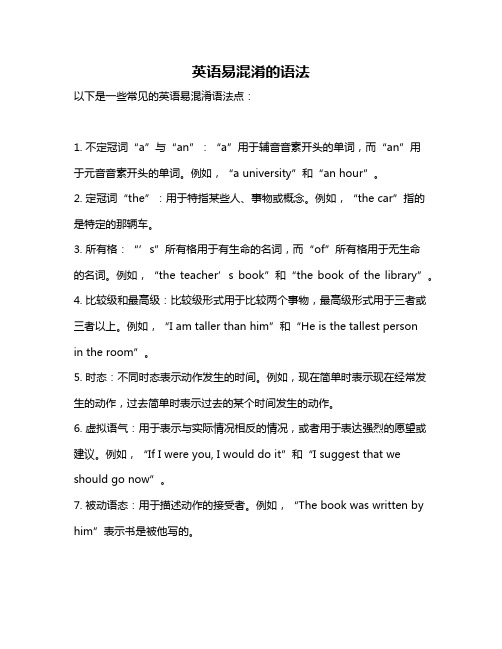
英语易混淆的语法以下是一些常见的英语易混淆语法点:1. 不定冠词“a”与“an”:“a”用于辅音音素开头的单词,而“an”用于元音音素开头的单词。
例如,“a university”和“an hour”。
2. 定冠词“the”:用于特指某些人、事物或概念。
例如,“the car”指的是特定的那辆车。
3. 所有格:“’s”所有格用于有生命的名词,而“of”所有格用于无生命的名词。
例如,“the teacher’s book”和“the book of the library”。
4. 比较级和最高级:比较级形式用于比较两个事物,最高级形式用于三者或三者以上。
例如,“I am taller than him”和“He is the tallest personin the room”。
5. 时态:不同时态表示动作发生的时间。
例如,现在简单时表示现在经常发生的动作,过去简单时表示过去的某个时间发生的动作。
6. 虚拟语气:用于表示与实际情况相反的情况,或者用于表达强烈的愿望或建议。
例如,“If I were you, I would do it”和“I suggest that wes hould go now”。
7. 被动语态:用于描述动作的接受者。
例如,“The book was written by him”表示书是被他写的。
8. 情态动词:表示可能性、必要性、意愿等含义。
例如,“I can do it”和“She must be at home”。
9. 动词不定式与动名词:不定式用于表示动作尚未发生,而动名词用于表示已完成的动作或状态。
例如,“to study”和“studying”。
10. 形容词与副词:形容词用于描述名词的属性,而副词用于描述动词、形容词或其他副词的状态或程度。
例如,“He is a good student”中的“good”是形容词,而“He runs quickly”中的“quickly”是副词。
英语易错易混短语
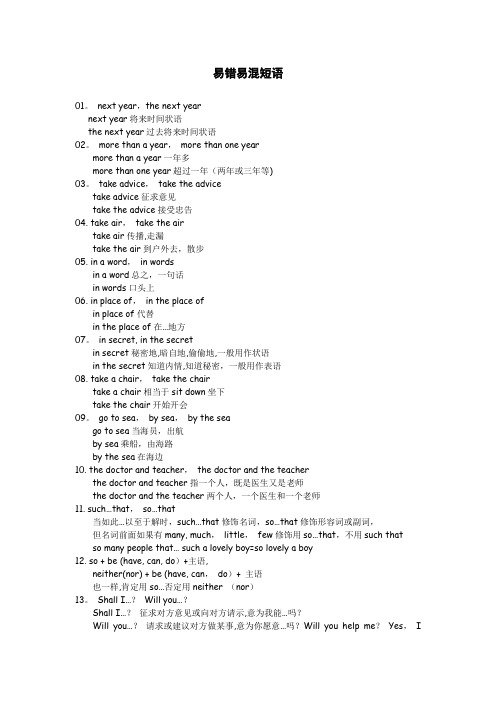
易错易混短语01。
next year,the next yearnext year将来时间状语the next year过去将来时间状语02。
more than a year,more than one yearmore than a year一年多more than one year超过一年(两年或三年等)03。
take advice,take the advicetake advice征求意见take the advice接受忠告04. take air,take the airtake air传播,走漏take the air到户外去,散步05. in a word,in wordsin a word总之,一句话in words口头上06. in place of,in the place ofin place of代替in the place of在…地方07。
in secret, in the secretin secret秘密地,暗自地,偷偷地,一般用作状语in the secret知道内情,知道秘密,一般用作表语08. take a chair,take the chairtake a chair相当于sit down坐下take the chair开始开会09。
go to sea,by sea,by the seago to sea当海员,出航by sea乘船,由海路by the sea在海边10. the doctor and teacher,the doctor and the teacherthe doctor and teacher指一个人,既是医生又是老师the doctor and the teacher两个人,一个医生和一个老师11. such…that,so…that当如此…以至于解时,such…that修饰名词,so…that修饰形容词或副词,但名词前面如果有many, much,little,few修饰用so…that,不用such thatso many people that… such a lovely boy=so lovely a boy12. so + be (have, can, do)+主语,neither(nor) + be (have, can,do)+ 主语也一样,肯定用so…否定用neither (nor)13。
容易产生歧义的双语对照句型

容易产生歧义的双语对照句型本页仅作为文档页封面,使用时可以删除This document is for reference only-rar21year.March趣看中国人最易误解的45句话1. The house is really A-1.(误译)那间房子的门牌确实是A-1号。
(正译)那间房子确实是一流的。
bought a baker’s dozen of biscuits.(误译)他买了面包师做的12块饼干。
(正译)他买了13块饼干。
bull of Bashan woke the sleeping child with his noise.(误译)贝兴的一头公牛弄醒了那个酣睡的孩子。
(正译)一个大嗓门的人把那个酣睡的孩子吵醒了。
was a cat in the pan.(误译)他是盘子中的一只猫。
(正译)他是个叛徒。
cat may look at a king.(误译)一只猫都可以看到国王。
(正译)小人物也该有同等权利。
a hair of dog didn’t make him feel better.(误译)即使一根狗毛也不会使他觉得好些。
(正译)即使是再喝解宿醉的一杯酒,也不会使他觉得好些。
he a Jonah(误译)他就是叫约拿吗(正译)他是带来厄运的人吗is fond of a leap in the dark.(误译)吉姆喜欢在黑暗处跳跃。
(正译)吉姆喜欢冒险行事。
little bird told me the news.(误译)一只小鸟将此消息告诉我。
(正译)消息灵通的人士将此消息告诉我。
is a man of a woman.(误译)安吉拉是个有妇之夫。
(正译)安吉拉是个像男人的女人。
is a man of his word.(误译)内莉是他所说的那个人。
(正译)内莉是个守信用的人。
paid a matter of 1000 yuan.(误译)他付了1000元的货物账。
英语易错译句子有哪些
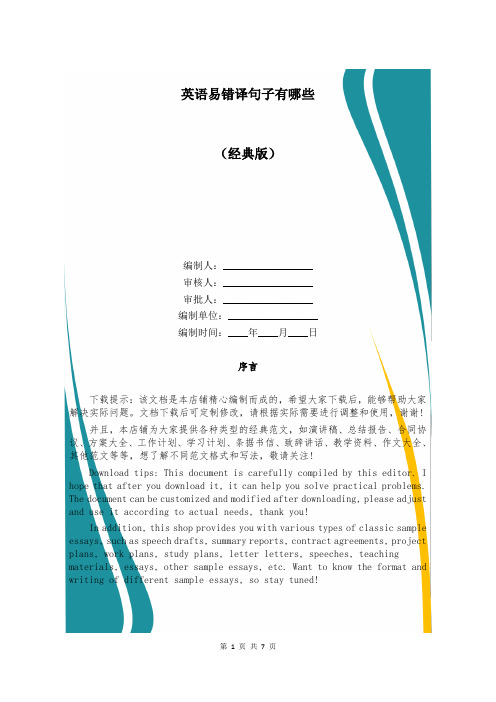
英语易错译句子有哪些(经典版)编制人:__________________审核人:__________________审批人:__________________编制单位:__________________编制时间:____年____月____日序言下载提示:该文档是本店铺精心编制而成的,希望大家下载后,能够帮助大家解决实际问题。
文档下载后可定制修改,请根据实际需要进行调整和使用,谢谢!并且,本店铺为大家提供各种类型的经典范文,如演讲稿、总结报告、合同协议、方案大全、工作计划、学习计划、条据书信、致辞讲话、教学资料、作文大全、其他范文等等,想了解不同范文格式和写法,敬请关注!Download tips: This document is carefully compiled by this editor. I hope that after you download it, it can help you solve practical problems. The document can be customized and modified after downloading, please adjust and use it according to actual needs, thank you!In addition, this shop provides you with various types of classic sample essays, such as speech drafts, summary reports, contract agreements, project plans, work plans, study plans, letter letters, speeches, teaching materials, essays, other sample essays, etc. Want to know the format and writing of different sample essays, so stay tuned!英语易错译句子有哪些高考英语试题中的六大考题都涉及到对句子的理解。
英语中容易误解的常见陷阱句汇总
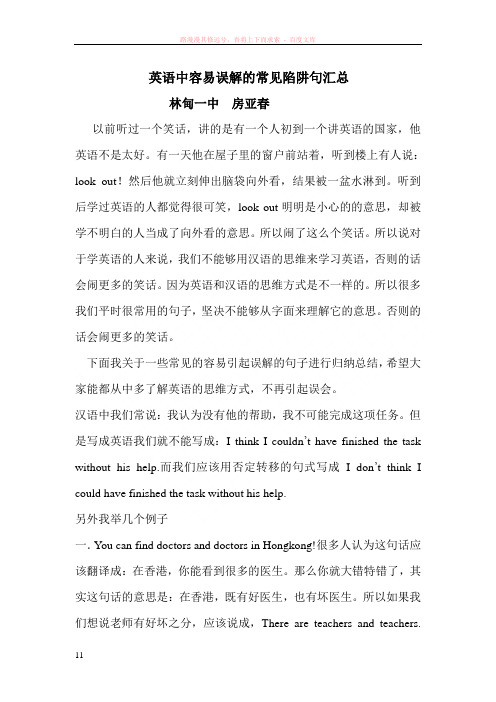
英语中容易误解的常见陷阱句汇总林甸一中房亚春以前听过一个笑话,讲的是有一个人初到一个讲英语的国家,他英语不是太好。
有一天他在屋子里的窗户前站着,听到楼上有人说:look out!然后他就立刻伸出脑袋向外看,结果被一盆水淋到。
听到后学过英语的人都觉得很可笑,look out明明是小心的的意思,却被学不明白的人当成了向外看的意思。
所以闹了这么个笑话。
所以说对于学英语的人来说,我们不能够用汉语的思维来学习英语,否则的话会闹更多的笑话。
因为英语和汉语的思维方式是不一样的。
所以很多我们平时很常用的句子,坚决不能够从字面来理解它的意思。
否则的话会闹更多的笑话。
下面我关于一些常见的容易引起误解的句子进行归纳总结,希望大家能都从中多了解英语的思维方式,不再引起误会。
汉语中我们常说:我认为没有他的帮助,我不可能完成这项任务。
但是写成英语我们就不能写成:I think I couldn’t have finished the task without his help.而我们应该用否定转移的句式写成I don’t think I could have finished the task without his help.另外我举几个例子一.You can find doctors and doctors in Hongkong!很多人认为这句话应该翻译成:在香港,你能看到很多的医生。
那么你就大错特错了,其实这句话的意思是:在香港,既有好医生,也有坏医生。
所以如果我们想说老师有好坏之分,应该说成,There are teachers and teachers.所以以后如果再遇到这样的句子时候,一定要注意千万别翻译错了,不然会引起很大的误会。
二.我们再看一个例子:I am too glad to see you. 我们不能按照常理认为too…to…是太…而不能。
如果这样的话就完全弄反了这句话的意思了。
我们应该翻译成我很高兴见到你,而不是我太高兴了不能看到你。
初中英语易混淆句子

初中英语易混淆句子1. Its vs. It's- "Its" 是形容词性物主代词,表示所属关系,如:The cat is washing its paws.its paws.- "It's" 是 "it is" 的缩写形式,表示 "它是" 或 "它有",如:It's raining outside.It's raining outside.- 记忆技巧: "It's" 中的 's 可以理解为 "is" 的缩写。
2. There vs. Their vs. They're- "There" 是指示代词,表示位置或存在,如:There is a book on the table.There is a book on the table.- "Their" 是形容词性物主代词,表示多个人的所属关系,如:Their house is big.Their house is big.- "They're" 是 "they are" 的缩写形式,表示 "他们是" 或 "他们正在",如:They're playing basketball.They're playing basketball.- 记忆技巧: "They're" 中的 're 可以理解为 "are" 的缩写。
3. Your vs. You're- "Your" 是形容词性物主代词,表示你的所属关系,如:Your bag is on the table.Your bag is on the table.- "You're" 是 "you are" 的缩写形式,表示 "你是" 或 "你正在",如:You're playing the piano.You're playing the piano.- 记忆技巧: "You're" 中的 're 可以理解为 "are" 的缩写。
初中英语阅读理解易混淆词汇

初中英语阅读理解易混淆词汇1. Disappear vs. Appear- Disappear means to vanish or go out of sight. Example: The magician made the rabbit disappear.- Appear means to become visible or be seen. Example: The sun appears in the morning.2. Accept vs. Except- Accept means to agree to receive or take something. Example: She accepted the gift with gratitude.- Except means to exclude or leave out. Example: Everyone was invited to the party except for Tom.3. Advice vs. Advise- Advice is a noun that refers to recommendations or guidance given to someone. Example: I need some advice on how to study effectively.- Advise is a verb that means to give recommendations or counsel to someone. Example: The teacher advised the students to review their notes before the exam.4. Adapt vs. Adopt- Adapt means to adjust or modify something to fit a new situation. Example: The plants have adapted to the desert environment.- Adopt means to take on or choose something as one's own. Example: They decided to adopt a pet from the animal shelter.5. Affect vs. Effect- Affect is a verb that means to influence or have an impact on something. Example: The bad weather affected our travel plans. - Effect is a noun that refers to the result or outcome of something. Example: The new policy had a positive effect on the company's profits.6. Desert vs. Dessert- Desert refers to a dry and arid land. Example: The Sahara Desert is the largest desert in the world.- Dessert refers to a sweet course served at the end of a meal. Example: I ordered a slice of chocolate cake for dessert.7. Principal vs. Principle- Principal refers to the head of a school or a sum of money invested or borrowed. Example: The principal announced the new school policies.- Principle refers to a fundamental truth or belief. Example: He always stuck to his principles and never compromised.8. Resign vs. Re-sign- Resign means to voluntarily leave a job or position. Example: The CEO decided to resign from the company.- Re-sign means to sign a document or contract again. Example: I need to re-sign the lease for my apartment.9. Compliment vs. Complement- Compliment is a noun that means a nice comment or praise. Example: She received many compliments on her new dress. - Complement is a noun or verb that means something that completes or enhances something else. Example: The red shoes complemented her outfit perfectly.。
- 1、下载文档前请自行甄别文档内容的完整性,平台不提供额外的编辑、内容补充、找答案等附加服务。
- 2、"仅部分预览"的文档,不可在线预览部分如存在完整性等问题,可反馈申请退款(可完整预览的文档不适用该条件!)。
- 3、如文档侵犯您的权益,请联系客服反馈,我们会尽快为您处理(人工客服工作时间:9:00-18:30)。
70个容易混淆的英语句子汇总
1. A lawyer would make a better statesman than a soldier。
(律师比军人更易成为政治家)
A lawyer would make a better statesman than soldier。
(律师更易成为政治家而不是战士)
2. He is a child of ten。
He is a father of ten。
(十岁孩子的父亲)
3. He served me with a kind of coffee。
He served me with coffee of a kind。
(象是咖啡的东西)
4. You love me better than he。
(和you平行)
You love me better than him。
(和me平行)
5. This is a photo of me。
(本人的)
This is a photo of mine。
(我所有的)
6. They are an industrious people。
(民族)
They are industrious people。
(人)
7. He is not a fool。
He is no fool。
(很聪明)
8. He has no more than ten books。
(只有十本)
He has not more than ten books。
(不足十本)
9. He is not a little afraid of it。
(很怕)
He is not a bit afraid of it。
(一点不怕)
10. I ask you nothing。
(没问你什么)
I ask you for nothing。
(没求你什么)
11. We hadn't anything to eat。
(没吃的东西了)
We didn't have anything to eat。
(没吃什么)
12. This is the same knife as I have lost。
(和我丢刀子一样)
This is the same knife that I have lost。
(就是我丢的刀子)
13. Ask him when he comes back。
(他回来时问他)
Ask him if he will come back。
(问他是否回来)
14. He is afraid to go out。
(不敢出去)
He is afraid of going out。
(怕出去)
15. He is the only son of a poor man。
(独生子)
He is only a son of a poor man。
(不过)
16. I am busy at the moment。
(眼下)
I am busy for the moment。
(暂时)
17. He went to Beijing for pleasure。
(游玩)
He went to Beijing with pleasure。
(高兴地)
He went to Beijing at pleasure。
(随心所欲地)
18. He presented a pistol to me。
(送我一支手枪)
He presented a pistol at me。
(拿手枪对着我)
19. His English is anything but correct。
(错误百出) His English is nothing but correct。
(不错)
20. He is a man of family。
(出身豪门)
He is a family man。
(有家室的人)
21. He is too glad to do so。
He is only glad to do so。
(极高兴)
22. I know him。
I know of him。
(听说过他)
23. I hope he will come。
I wish he would come。
(多希望他来)
24. I sent him to the doctor。
I sent him for the doctor。
(请医生)
25. He threw a bone to the dog。
He threw a bone at the dog。
(用石头砸狗)
26. He has nothing to write。
(没写什么)
He has nothing to write with。
(没笔写)
27. He has no one help him。
(不让人帮他)
He has no one to help him。
(没有帮他的人)
28. Have you finished your work yet?
Have you finished your work already?(已完,表示吃惊)
29. Did you do any work last night?
Did you do some work last night?(表示知道,肯定)
30. I left the window open。
(忘了关窗户)
I kept the window open。
(表示故意)
31. Your request is out of question。
(没问题)
Your request is out of the question。
(不可能)。
